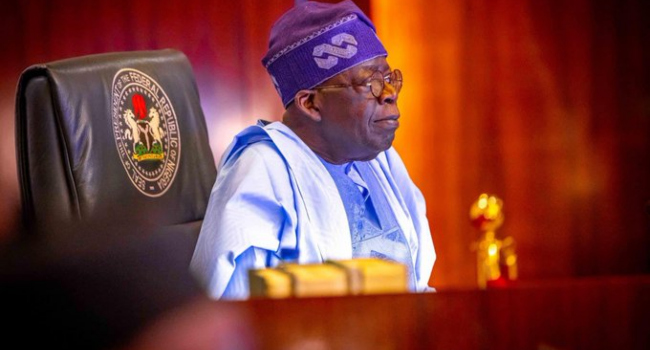The Federal Government has refuted insinuation in certain quarters that President Bola Tinubu is being controlled by cabal and shadowy inner circle in his government.
The Minister of Information and National Orientation, Mohammed Idris, denied this in Abuja on Thursday while delivering an address at the APC National Summit with the theme “Renewed Hope Agenda: The Journey So Far.”
The minister said that the President, rather, welcomed a wide range of perspectives, and took informed decisions solely in the best interest of Nigeria.
“You need to study the president very well. You can have your voice; you can say what you want to say; he will listen to you but his decision is ultimately his own. I think it’s important for us to recognise that,” he said.
Speaking on the theme of the summit, Idris said, President Tinubu remained committed to transforming Nigeria through the Renewed Hope Agenda, describing it as a bold, people-first blueprint turning obstacles into opportunities.
“The Renewed Hope Agenda is about positively impacting the lives of the people of Nigeria, through bold decisions designed to unleash the full scale of Nigerian potential, in a way that has never been seen or done before,” he said.
The minister recalled that Tinubu inherited a nation at a crossroads and immediately moved with clarity and courage.
“Among the first decisions the President made were the removal of petrol and foreign exchange subsidies, which had been amongst the biggest impediments to Nigeria’s progress, costing us billions of dollars in losses and waste,” he said.
Idris noted that “true leadership involves the ability to make decisions that might be tough in the short term, but are guaranteed to deliver lasting returns.”
He said the outcomes of the president’s reforms were now evident across all sectors through large-scale infrastructure, social investment programmes, revamping of the nation’s mining and petroleum sectors among others.
“At the federal level, the increased revenues have set a new standard for ambition and execution of large-scale infrastructure projects,” Idris said.
He highlighted four signature highways — the Lagos-Calabar Coastal Highway, Sokoto-Badagry Superhighway, Calabar-Abuja Superhighway, and Akwanga-Jos-Bauchi-Gombe Highway.
Idris said the four signature highways totalled more than 2,600km and linked communities and economies across the country.
“Another flagship project driving regional integration is the Kano-Kaduna Standard Gauge Railway.
“This vital corridor is a key component of the Lagos-Kano railway modernisation plan and is being delivered as a priority under the Renewed Hope Agenda.,” he said.
In the housing sector, the minister said the administration launched the Renewed Hope Cities and Estates Projects, “an ambitious intervention aimed at addressing the nation’s housing deficit while stimulating job creation and urban renewal.
To support the growing digital economy, Idris said that the Federal Government deployed 90,000km of fiber optic cable nationwide.
He described the on-going project as “unprecedented scale of broadband infrastructure which will not only bridge Nigeria’s digital divide but also support smart governance.
He added that the fibre optical cable project would attract digital investments, and enable secure e-services in education, healthcare, commerce, etc.
Idris said about 300,000 Nigerian students are now benefitting from the National Education Loan Fund (NELFUND), while workers are accessing the new Consumer Credit Scheme to buy essential goods.
On security, Idris said, the military neutralised and arrested thousands of terrorists and bandits and rescued nearly 10,000 hostages.
He said, more than 25 new aircraft had been acquired, and the Navy had taken delivery of four new vessels.
He hailed the president for establishing the Ministry of Livestock Development and Regional Development Commissions across the six geo-political zones.
The Minister emphasised that the Renewed Hope Agenda is holistic and people-centered.


